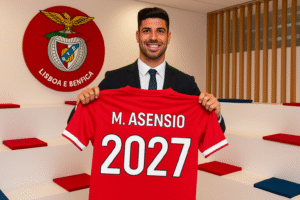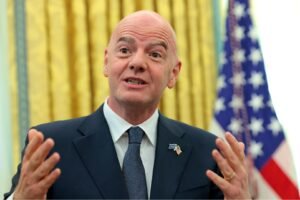
Burnley, Leeds United and Leicester City are among the clubs assessing their options over compensation claims after Everton were found guilty of breaching the Premier League’s profit and sustainability rules
The decision by an independent commission to hand Everton a 10-point deduction for a breach of the Premier League’s profit and sustainability rules sent shockwaves through English football.
The Blues are set to appeal against the decision, made by a three-person panel, believing it to be excessive in force, given they have been landed with the biggest points deduction in the league’s history after one charge was upheld. It is a decision that plunged Everton into the relegation zone, and while hopes of staying up this season remain strong, the uncertainty remains due to the potential for compensation claims to be made by aggrieved clubs.
Earlier this year, Burnley, Nottingham Forest, Leeds United, Leicester City and Southampton all made an interim application for compensation claims to be considered as part of the commission’s review. That was rejected given the complexity of determining the outcome in a tight timeframe. But with a verdict now delivered, three of the clubs are understood to be considering making a claim for compensation.
Burnley, Leeds and Leicester have fallen through the Premier League trapdoor in the past two seasons, something that brings with it significant financial losses. Everton, in the past two years, were direct relegation rivals to the clubs in question. And given the financial breaches that the club has been found guilty of, the trio are assessing whether or not they have a claim to recoup some of those losses from the Blues, with the argument being that they may have had an unfair advantage.
But did they? And how hard will it be to prove that the reason for the competitive failure of Burnley, Leeds and Leicester in their relegation seasons was a direct result of Everton breaching the rules? In short, it won’t be easy.
Speaking to the ECHO, a partner in the sport group at the Sheridans law firm, Nii Anteson said: “It’s an interesting one because there was an interim application from various clubs to become parties to the proceedings against Everton. That was declined and I think the commission was very clear that the rules didn’t really allow for that. What the rules do allow for is for third party clubs to submit evidence in relation to their losses, and then the commission can consider that.
“One of the commission’s discretionary powers is to award compensation, and I expect the reason it didn’t do that in this case was because any relegated club’s claim is quite complicated because it’s not necessarily a direct case of causing loss. You still have to establish on the balance of probabilities that, but for the breaches by Everton, you would have survived, and that would have been more likely than Everton surviving anyway. That is how the commission decided to deal with it.
“I don’t think that any club would be well advised to start pursuing compensation until Everton’s appeal is dealt with, so that you don’t have the risk of wasting costs and then the sanction, or the finding that they breached the rule is overturned.”
While there is no direct precedent having been set to judge on such matters, the case of West Ham United’s signing of Carlos Tevez and Javier Mascherano in the 2006/2007 season may offer some clues as to what may be at play by making a claim.
Tevez and Mascherano’s arrival stunned football, and their presence, particularly the former, helped thrust West Ham to safety, resulting in last-day drama where Sheffield United went down at their relegation rivals’ expense. But the Argentine duo’s signings had breached Premier League rules around third-party ownership – in this case the third party being agent Kia Joorabchian.
In that case West Ham stayed up and an aggrieved Sheffield United took action. In the end it was settled by a £20m sum being paid, avoiding a points deduction. West Ham’s finance director at the time, who alerted then owner Eggert Magnusson to the potential breach, was Nick Igoe, who was part of the three-person independent commission panel that led to Everton being deducted 10 points.
Figures of as much as £300m were bandied around in some reports in the wake of the decision, but Anteson believes legal action being pursed will be in an attempt to try and get at least something from the situation.
“I was reminded by a colleague that the one instance that a club has been able to get something out of breach of the rules where a club stayed up at another’s expense, was Sheffield United and West Ham United,” said Anteson.
“In that case it was quite straightforward that Carlos Tevez was clearly the impetus and his acquisition hadn’t been ruled a breach of the third party ownership rule. He was clearly the impetus for West Ham’s survival.
“The form the claims may take is that when the clubs were Premier League clubs at the same time, the Premier League rules acted as a contract between the clubs and it was agreed we would all abide by the rules etc, and by Everton breaching the rules breached the contract and clubs could argue they have suffered loss. That loss could be broadcasting revenues, it could be as speculative as lost advertising revenues.
“There is an identifiable body of loss that you could say is foreseeable, but the issue is causation and the clubs would have to put forward a persuasive counterfactual. You can take different approaches to this. You would need evidence from maybe a data and analytics company to put forward probabilities, ie ‘but for X player we would have had a chance of getting X result which would have helped us to stay up’.
“You can see the difficulties with these kinds of claims because even if you are successful, no doubt the tribunal would discount, even if they agreed with you, whatever they award you to reflect the probability of it not happening.
“Much of the overspend is supposed to relate to stadium development costs. The commission found that Everton hadn’t overspent on players, it’s not as straightforward as identifying a particular player who was the thrust of a survival effort. There are lots of complications that would face these clubs if they tried to bring a claim.
“Legal action isn’t always the end, it can be a means to an end. In the Sheffield United and West Ham case I think West Ham ultimately agreed to pay £15m plus five to get rid of that issue. I’m sure that these clubs will have their own advice in terms of the merits of pursuing a claim, but it might not be the end, it might be a case of trying to get something by way of resolution.”
Anteson believes that the punishment handed down to Everton is one that has been done to urge clubs to ensure that they are spending within their means and staying within the confines of the profit and sustainability regulations that all clubs in the Premier League agree to, and must adhere to.
Said Anteson: “It is a momentous decision and there are some key takeaways for other clubs, but it really is quite distinctive from the Manchester City and Chelsea cases.
“Other clubs will look at this, particularly the line from the Everton representative (as detailed in the independent commission’s report) around their role being like that of a tax accountant, for them to interpret the rules in a way that favours the club. The commission was quite clear that the duty of good faith to the league and to each other trumps that. I think it will incentivise clubs to adhere more strictly to the profit and sustainability rules.
“I think the Premier League was quite keen, maybe with the spectre of this independent regulator coming down the line, that the clubs adhere strictly to the rules.”






